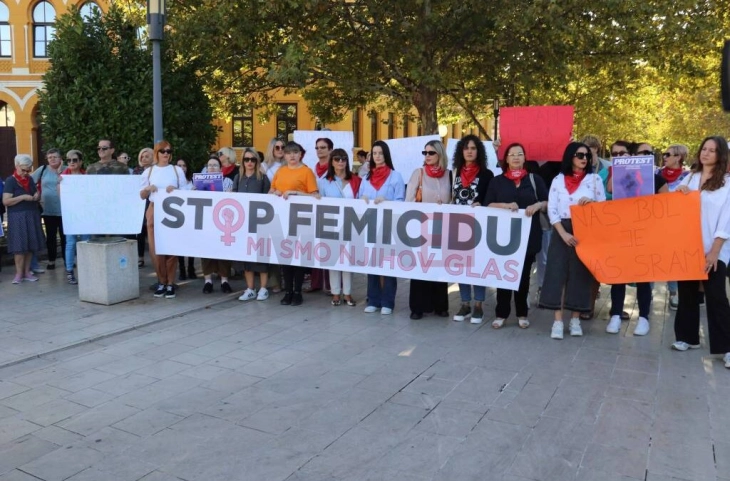EU law on violence against women divides bloc over key component
- EU member states and the European Parliament have agreed on the bloc’s first-ever law to combat violence against women. But the final text fell short on one key element: the inclusion of a common definition of rape. Despite legislative efforts, violence against women and domestic violence persist across the European continent.

21 February 2024
ENR - Brussels
EU member states and the European Parliament have agreed on the bloc’s first-ever law to combat violence against women. But the final text fell short on one key element: the inclusion of a common definition of rape. Despite legislative efforts, violence against women and domestic violence persist across the European continent.
After months of intense negotiations, the EU has agreed on its piece of legislation to combat violence against women and girls, a comprehensive directive that aims to harmonise legal definitions and minimum prison sentences for offenders all over the EU.
The law seeks to protect women in the 27-nation EU from gender-based violence, forced marriages, female genital mutilation and online harassment. The text criminalises cyber-stalking, cyber-harassment and cyber-incitement to hatred or violence across the Union.
The European Commission first proposed the major legislation on March 8, 2022, to mark International Women’s Day.
The latest agreement does not, however, include a common definition of rape, which proved to be the most controversial point in the negotiations.
European Parliament’s chief negotiators for the file, Swedish MEP Evin Incir (S&D) and Irish MEP Frances Fitzgerald (EPP), did not hide their disappointment during a press conference in Strasbourg and hoped the directive will become “the beginning, not the end” of legislation to fight violence against women in the EU.
Negotiations tainted by rape definition dispute
The step to include a common definition of rape, urged by many, was blocked by several EU countries, led by France, Germany, Austria and the Netherlands. They entrenched themselves behind technical-legal reasons on how to adopt the proposal, arguing that rape is not a “European crime”. Other traditionally conservative countries such as Poland, Hungary, Malta, the Czech Republic, Estonia, Bulgaria and Slovakia took the same line.
The European Parliament and at least a dozen EU countries including Belgium, Greece, Italy and Spain had wanted to include a definition of rape based on the absence of explicit consent. Four Spanish MEPs have been part of the European Parliament’s negotiating team and three of them have been vocal about the need to bring European legislation up to speed with the standards in countries like Spain.
The states in opposition of defining rape in the text argued that the EU has no competence in the matter. Critics of the rape definition argued that there was no legal basis for such a standardised regulation in European law. A corresponding article therefore did not make it into the law. Germany and France believed that the risk of including a definition is that it could be overturned by an EU court following a legal challenge.
The reluctance to agree a definition of rape sparked controversy in France, where President Emmanuel Macron had said tackling violence against women would be a priority of his second term. Macron had already elicited criticism after defending the presumption of innocence for French actor Gérard Depardieu, who has been charged with rape and sexual harassment.
Although the text does not contain a definition of rape, member states will aim to raise awareness that non-consensual sex is considered a criminal offence, the European Parliament said in a statement. The European Commission will have to report every five years on whether the rules need to be updated, it added.
Building on the Istanbul Convention
European Commission Vice-President Věra Jourová told the Czech News Agency CTK that the directive replaces the Istanbul Convention in a way.
“We have never had such a directive on violence against women. It is also a reaction to the fact that not all EU countries have ratified the Istanbul Convention on which I have been counting for years to be a safeguard against violence targeting women, and against domestic violence,” said Jourová.
She did not understand why the Czech Republic has not ratified the Convention yet. “I am sorry. I think that alarmists and disinformers have won over common sense,” she said, adding that the Czech Republic has thus joined the group of countries “where the church has a huge influence and would like to return life to the 19th century.”
The Istanbul Convention recognises violence against women as a violation of human rights and a form of discrimination against women, committing the country to take legislative and other measures to ensure a legal, institutional, and organisational framework for preventing violence against women, protecting victims, and punishing perpetrators.
Other countries that have not ratified the Istanbul convention include Bulgaria, Hungary, Latvia, Lithuania and Slovakia. To put things in perspective, non-EU member Bosnia and Herzegovina already ratified the Istanbul Convention in 2013. Accordingly, gender-based violence should be punishable by law in the country.

Across Europe, violence against women persists
Despite pledges to implement the Istanbul convention, Bosnia and Herzegovina has been shaken by increasingly frequent murders of women over the past year. Following the latest murder in the northern part of the country, thousands of citizens held a peaceful protest walk, and a day of mourning was declared. However, the most prominent outcry from the public was sparked by a triple murder in August, where the perpetrator killed his wife in a live broadcast on social media and, in another video, claimed he had killed two others as well.
In the rest of Europe, violence against women and domestic violence also remain persistent problems.
“It is a systemic problem, with deep roots in the social structures and in many cases it reflects the failure of the protection system that should ensure the security and integrity of half of the country’s population,” says Raisa Enachi, chairwoman of the Committee for equal opportunities for women and men in the Chamber of Deputies of Romania.
According to the latest data from the Slovenian National Statistical Office, women are three times more likely to be victims of violence in an intimate relationship than men. Women are also more likely to be victims of serious forms of violence. The Slovenian police deal with just over 1,000 cases of crimes with elements of domestic violence annually. More than 90 percent of the perpetrators are male and the victims are predominantly women and children, according to the helpline Association SOS hotline for Women and Children Victims of Violence.
The head of the European Commission’s representation in Sofia, Boyko Blagoev, has cited Eurostat data, according to which 21 percent of women in Bulgaria who have ever had a relationship have experienced intimate partner violence during their adult life. Deputy Prime Minister Mariya Gabriel said in January that more than 20 women had been killed by men in Bulgaria in 2023. The number of registered cases of domestic violence was almost 1,400, she added.
In September last year, the Bulgarian government decided to appoint Gabriel as head of the National Council for Prevention and Protection from Domestic Violence, whose members were designated by the government on February 7, 2024. The council includes ministers, representatives of government agencies and NGOs and is focused on the implementation of the state policy to combat domestic violence.
For the EU directive on violence against women to come into force, it still needs to be approved by member state ministers and passed by the plenary of the European Parliament, but it is expected to pass smoothly. Commission Vice-President Věra Jourová expects the directive to be finally adopted by the end of April.
The content is based on news by agencies participating in the enr.
Photo: ENR/dpa/FENA







